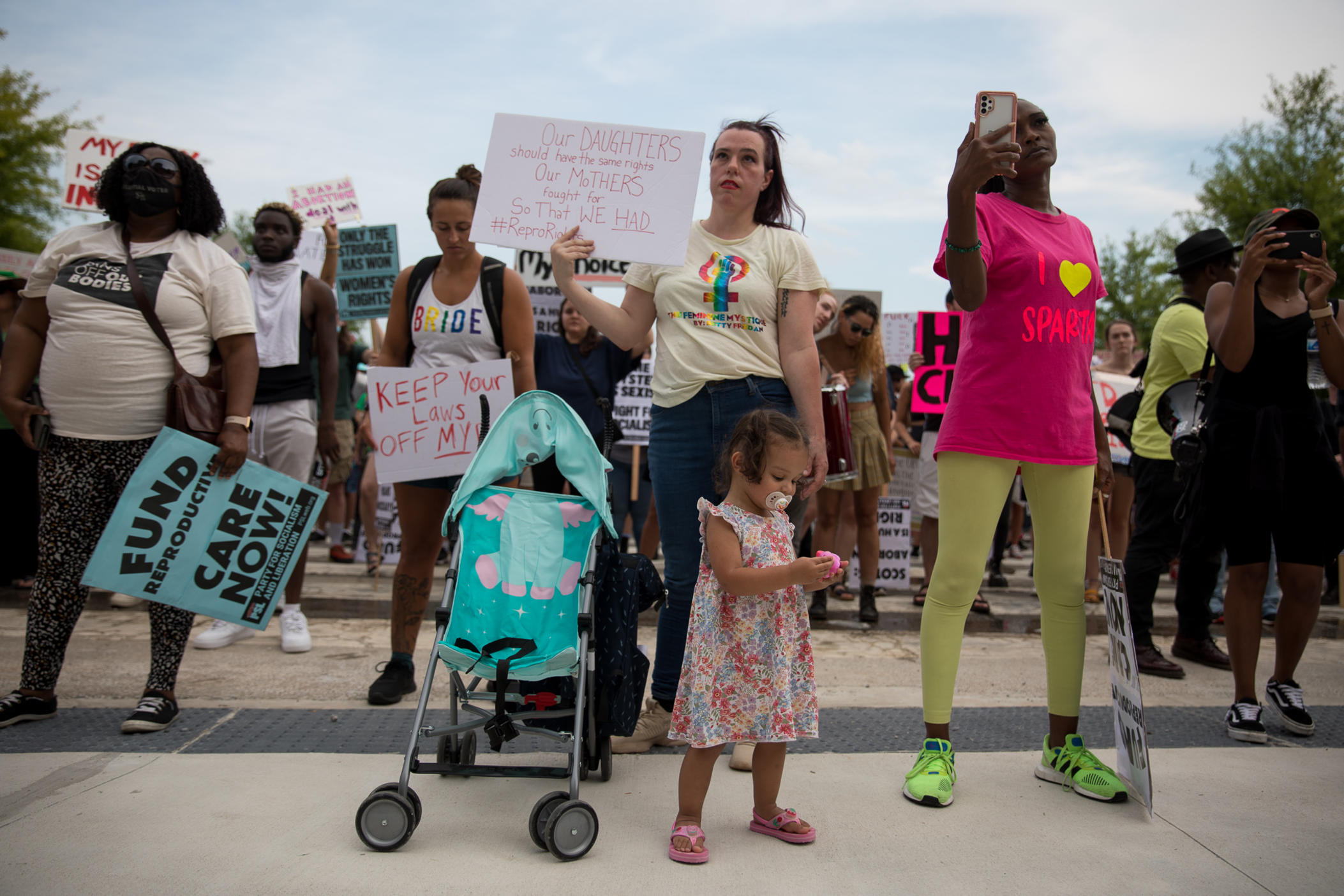Section Branding
Header Content
Battleground: Ballot Box | Georgia reacts to Supreme Court abortion decision
Primary Content
The Supreme Court’s decision last month to effectively overturn Roe v. Wade, thus reversing a constitutional right to abortion, has sent shockwaves through Georgia.
The Dobbs v. Jackson ruling sends control over abortion laws back to the states. In Georgia’s case, that could make HB 481, passed in 2019, the law of the land. It makes abortion illegal, in most cases, around six weeks into pregnancy, or when fetal cardiac activity can be detected. But it’s still held up in courts.
In a midterm election year that will decide who charts Georgia’s political course for the next several years, the stakes are high. And Democrats and Republicans say the post-Roe landscape has only raised them higher for this November.
This week, we look at the aftermath of the Supreme Court’s decision to undo precedent around abortion and upend politics in the process.
It was not a surprise that the highest court in the country would rule the way it did, or that protests would spring up across the country. But when the order came out the morning of Friday, June 24, Diane Derzis was still a little shocked.
"We’ve been working on this for months, and I thought we were in good shape," she said. "But then it’s like ‘Oh my God!’"
She talked with GPB's Grant Blankenship shortly after the decision in the Dobbs v. Jackson Women’s Health Organization case, which abruptly ended abortion access in much of the South with other states soon to follow. Derzis is the owner of the Jackson, Mississippi clinic, as well as the Columbus Women’s Health Organization clinic in Georgia, just across the state line from Alabama, where abortion access ended as soon as the decision was announced.
She’s worked in this space for nearly half a century and said after the ruling her phones were ringing off the hook.
By ending decades of existing abortion access precedent, the Dobbs decision effectively bans the procedure in many Southern states. But not Georgia — at least not yet.
"As of today, abortion is still legal and accessible in Georgia," Kwajelyn Jackson with the Feminist Women's Health Center in Atlanta said. "So we want to encourage people to keep their appointments and if they are in need of services to continue to connect with providers and funds."
That’s because Georgia’s 2019 law, the “Living Infants Fairness and Equality Act,” is on hold in the courts because, up until last month, it violated the Constitution under the Supreme Court’s previous rulings.
Georgia’s abortion law would effectively ban most abortions in the state around six weeks into pregnancy — before many would even know they are pregnant — and adds so-called "fetal personhood" language that changes the definition of a "natural person" to include "an unborn child at any stage of development who is carried in the womb."
RELATED: What does Georgia's 2019 abortion law HB 481 do?
Currently, state law allows for abortions until 20 weeks into a pregnancy with no limitations, and after 20 weeks in certain circumstances, including a physician determining the pregnancy is medically futile or determining it is necessary to preserve the life and health of the mother.
Georgia law does not currently ban the use of medicated abortion, which uses the two drugs mifepristone and misoprostol and can take place within the first 10 weeks of pregnancy. But state law does prevent physician’s assistants and advanced practice registered nurses from providing medicated abortion.
According to Georgia Department of Public Health data, there were more than 31,000 abortions that took place in the state in 2020, the most recent year with reported data.
Jackson said it’s still important for people to know that in Georgia, options are available under the current law and if the new one takes hold.
"I want to make sure that people understand that while this is devastating news and will affect the entire country, today abortion is still legal and accessible in Georgia," she said. "And that we do not want people to panic, to cancel their appointments, to feel that they are without options. We want to make sure that everyone who needs an abortion is able to get one safely and compassionately."
In Savannah, shortly after the decision came down, Stephanie Jones was in Forsyth Park. She told GPB's Benjamin Payne that she’s concerned about a post-Roe Georgia.
"My initial reaction is fear, especially for my children," she said. "I’m concerned that when they come of age, the risk of pregnancy and what will our options be."
There are fewer than two dozen clinics and facilities in Georgia that provide abortions, according to the pro-abortion rights research organization the Guttmacher Institute. But already, that number is going down. While Diane Derzis' Columbus clinic is still in operation, the only facility providing surgical abortion in Savannah has closed.
The Savannah Medical Clinic opened in 1977, just a few years after the landmark Roe v. Wade decision. The only remaining abortion provider on Georgia’s coast is the Planned Parenthood clinic in Savannah, which only offers medical abortion.
The closest surgical abortion providers are now hours away, in Augusta and Jacksonville, Fla.
"Women are going to be forced to travel, whether it’s via plane or bus or whatever it takes, depending on their financial standing," Derzis said, adding that it will take much more time and effort for people to go to a place where abortion is legal.
For Republicans in Georgia and other Southern states, that’s the point. They’re more divided on what comes next.
Gov. Brian Kemp, speaking on Fox News, blasted his opponent Stacey Abrams’ opposition to Georgia’s law and said the GOP in Georgia values life beyond just banning abortion.
"I ran as a pro-life governor," he said. "I know that people disagree on these issues, but the thing is: You never hear [Abrams] talk about adoption reform, our fight to end human trafficking. Not only that, supporting the victims and helping them become a contributing member of society. We’ve done those things; it shows our total value for life regardless of where you stand on the abortion issue."
But some conservatives are pushing for more, seeking an outright ban on abortion, including medical abortion, and more punishments for those who aid in someone seeking an abortion.
Abrams and Democrats say Georgia’s abortion law is the last straw for a state with terrible maternal mortality statistics, lacking rural health care infrastructure and a relatively weak safety net for parents.
"I believe that we have to begin by solving the immediate crisis in front of us," Abrams said in Dublin, "which is the fact that Georgia has a six-week ban: a ban that takes effect before women know they’re pregnant in a state that has half of its counties without an OB-GYN."
She told GPB's Sofi Gratas her stance on abortion rights, too.
"I believe that abortion should be the choice of a woman as long as and up until the viability of the fetus outside of a woman’s womb, except in the case of a danger to woman’s health of life," Abrams said.
Abrams argues that Kemp’s refusal to expand Medicaid coverage in Georgia, coupled with tighter abortion restrictions, contributes to worse health outcomes for Georgians and is why she should lead the state.
Beyond the political ramifications for Georgia in November, medical professionals are voicing their concerns about Georgia’s health inequalities and the effects further abortion restrictions might have.
Haben Debessai is a resident physician and OB-GYN in Atlanta, who said Georgia's abortion law wasn't written with medical perspective.
"I think that we need more clarity before we can put that into practice," she said. "No matter what side we fall on the issues, a lot of these things are not medically appropriate and they’re not going to be effective in practice without harming women and pregnant people in the process."
Mimi Zieman, also an OB-GYN, said courts and lawmakers should not intrude on reproductive rights issues.
"The decision about whether or not to carry an unexpected pregnancy to term is a deeply personal one, and a woman seeking an abortion should be able to receive compassionate care, guided by unbiased medical information rather than political agendas," she said.
Georgia’s elections were already slated to be fiercely contested before the decision came down, but a reignited debate over abortion access, a law that potentially could be held up in court even further, and wildly different views about what comes next makes the stakes even higher for November’s midterm elections.
Battleground: Ballot Box from Georgia Public Broadcasting is produced by Stephen Fowler. Our editor is Josephine Bennett. Our engineer is Jake Cook and Jesse Nighswonger wrote our theme music. You can subscribe to the show on Apple Podcasts or anywhere you get podcasts. Thanks for listening.



